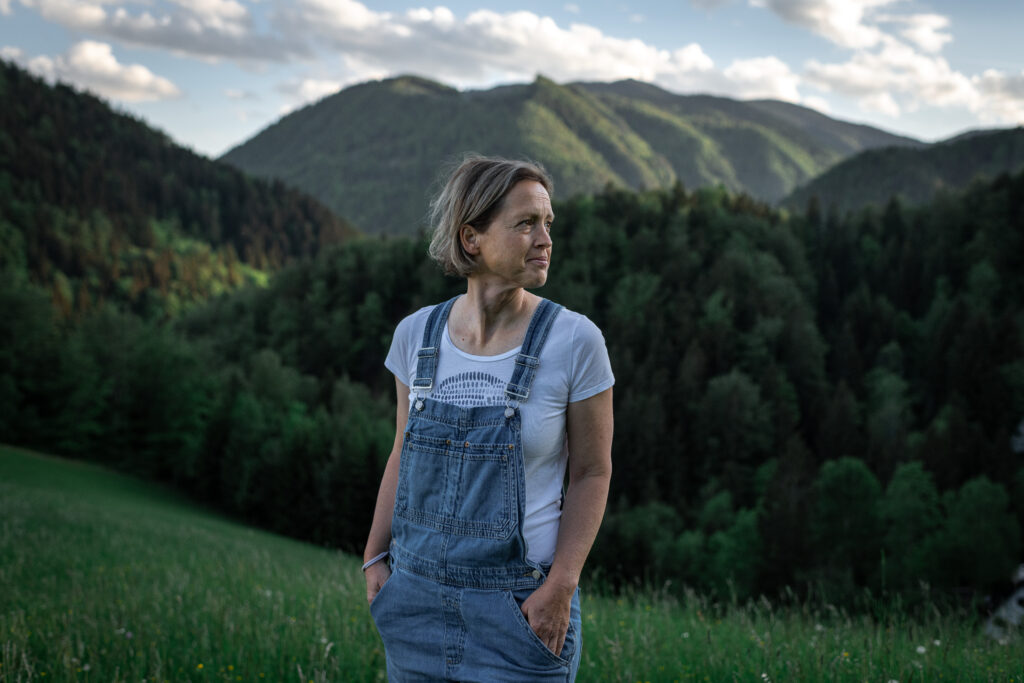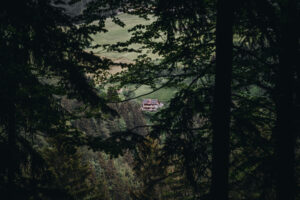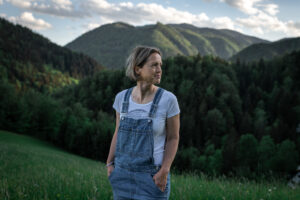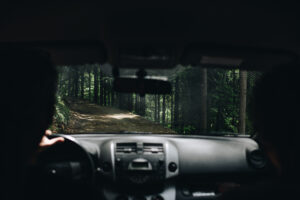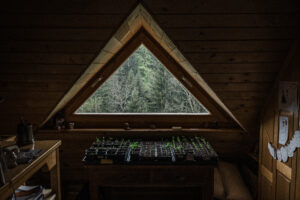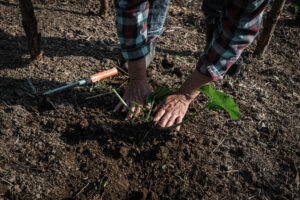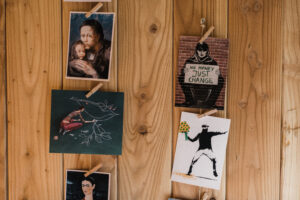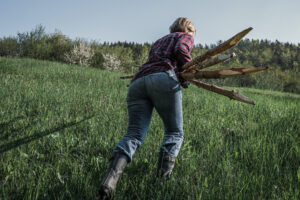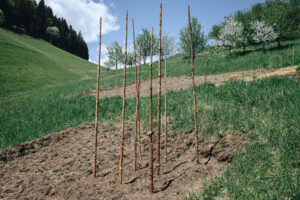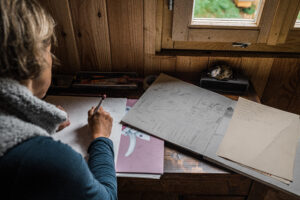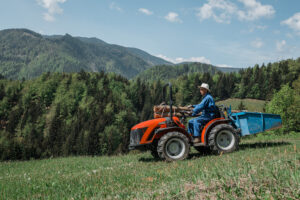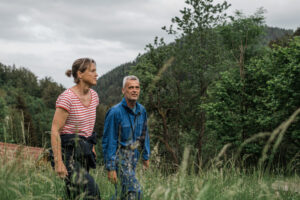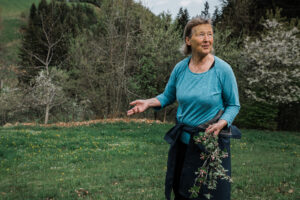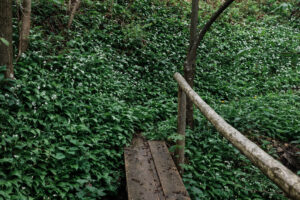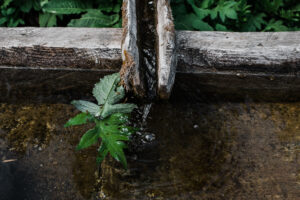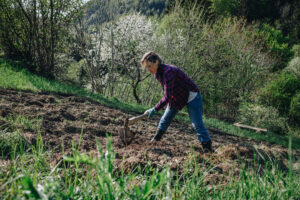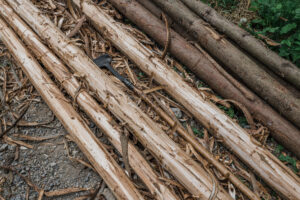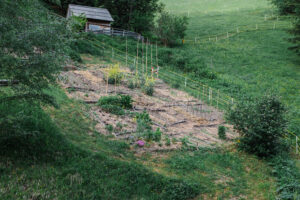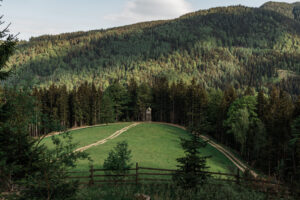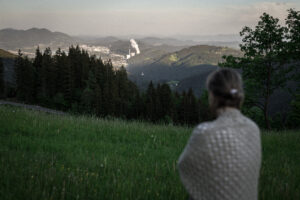Quitting
It was one of those cold October days in Amsterdam in 2019. The alarm went at 4:30 am; we rushed onto our bikes to join up with Extinction Rebellion at the Rijksmuseum. There were police, horses, blue lights, riot wagons…and hundreds of people singing climate and social justice songs while blocking the road. It went on all day long. Sitting, singing, chatting and waiting to see whether or not the police will get to our row and drag us into their arrest vehicles. We were corporate rebels at that time, cozy in our great outdoor clothes, protected by our company in case something would go wrong.
That day gave me lots of time to think. What are we doing? How come we are sitting here asking a government for more progressive policies whilst we are living a lifestyle that supports the destruction? I knew so much about the environmental issues. I hoped that things would change and yet, I was silently reluctant to embrace that change. But on this day the seed of discontent I had inside me that I was part of the problem became a seedling.
My seedling of doubt kept growing over the next months. Until… the day came. I walked into the office to have that talk . A bit of panic about what to do next also entered the stage. And all the sudden, with some others from that cold October roadblock, we were on our own —going back home.
My life before
I spent most of my life in the environmental field, travelling and working from Slovenia, the US, China and the last years in Amsterdam. My last job was considered by many to be the environmental dream job. I had a lot of resources at hand to support environmental movements across Europe and beyond.
But I grew more and more uncomfortable with the paradox of comfortably working in the ‘sustainability bubble’ and yet living my life in the same system that had created the multiple crises we are in. And even though I was doing my best to fight that system from within or maybe because I was – it was hard to find sense and peace within me — so I quit.
A day after
I woke up on July 1st 2020, in a small village close to Amsterdam in the caravan my husband Robert and I used to escape the city and looked out the window. My little garden was in full growth, the local heron was standing still on the edge of a shallow canal, geese were making their screamy noises on the other side, summer was here. The water had a sugary scent and the fields around smelled of fertilizer, which was quite usual for that time of the year.
I felt empty. I felt I had once again given so much of me to something I believed would change our trajectory. And yet I had to admit to myself, that the systemic changes we need would not come from the direct correctives I had been working on..
This emptiness in my head and heart continued for several months, while I kept busy getting our new tiny home ready. Ready so we could live in it or be free to come and go if we decided so. And then In December, as every year, we drove to my home in Slovenia to celebrate Christmas with my family.
It’s August 2022…and we are still in Slovenia.
New realities
COVID-19 made us overstay our initial plan and then we just kept staying on my parent’s farm in the mountains, without a very definite agenda. I studied permaculture and threw myself into all sort of learnings on cultivating the land with nature, and my husband wrote a book. We worked outside a lot alongside my family and for most of the year avoided having a conversation about what is next. My mom gave me a piece of land where I started a ten-times bigger garden than I had back in the Netherlands, and Robert spent a lot of time with my stepdad learning how to work with wood. We both needed to learn a lot of things around the maintenance of a farm, its facilities and how to use tools we had never used before.
It wasn’t easy for two people who for years had spent most of their day in front of a computer. It was actually very frustrating because we were both used to being good at our previous work, and here we started as total beginners. Imagine, we stopped doing what we were good at, now what? How do we learn, where do we go for an advice, how do we feel good about ourselves enough that we keep motivation to go on?
We progressed with a certain degree of clumsiness, learning how to live in a place where you cannot really call on any service when something goes wrong. We learned to go and fix it ourselves. If we could not fix it, as there are not a lot of people around to hire like before in the city… we had to learn how to fix it!
Old and new
I grew up in an industrial town near the farm, where we measured progress by the amount of coal that was dug up every year. At the same time, I spent many days on this same farm where we are now living. My grandparents were small farmers who got this land from their parents after they got married and managed to farm four hectares in a way that nine people were able to eat and go to school. They managed this with two cows and two pigs and most of the land dedicated to growing everything from oats and potatoes to vegetables and fruits. Still my grandfather had to take a job in a local leather factory to make ends meet, and my grandmother was selling milk products here and there and writing reports for a meteorological station in Ljubljana.
This harsh life from two generations ago is still echoing around here. So our excitement about the possibilities of this land is often met with disbelief or we get told that those things are not possible, not here. It doesn’t help that we are armed with a pile of books from all around the world on how to treat soil, animals and food. And even though in the last 18 months we have had some small ‘success’ stories – each day remains a balancing act between respecting how things have been done for decades and the itch to approach this land from a very different perspective.
Office vs. land work
I had a hard landing from a very romantic view of what working on the land is like to the very practical imperfect hands-on reality of taking it on day to day. During a task, your eyes always see ten other things that need to be done. The day-to-day scheduling and organizing of the work is so different from in the office. There we all had tools to schedule meetings and tasks, it was kind of automatic. It took only a bit of time every week and it didn’t take much effort.
Oh how different that is now — being back home, working with my hands. First, they are not co-workers anymore, but family members that we see and work with on a daily basis. So there is a lot of preset ways of communicating and deciding what needs to be done. I am still frequently lost in this specific dynamic and some days feel bewildered by how I keep failing to do what needs to be done (at least what should be done in my head;). It can be very frustrating when you plan your day and then someone has a different idea of what is important to do. Or when you walk all the way up to the field and realize you forgot something that you need. Or when the tool you want to use to do that work is suddenly not working. Or the tractor doesn’t start. Or there is a small flood in the kitchen from who knows what…and you have to fix it because the service for such things takes a week before someone can come up here.
The beauty of this rhythm is that you don’t think in terms of our usual time anymore. We wake up when our animals are up. We know the working day starts when the church bells on a neighbouring hill ring at 7am. Then when you are caught up in your work, the bells go at noon for the second time, and it’s time to cook and eat. And when they ring for the third time, it is evening and you are usually sitting outside the kitchen with the sun down and it’s time to call it a day.
There is also a physical aspect of the work. I cannot do 10-12 full hours outside, like I could sitting in front of a computer and in meetings. Funny how this aspect of working never entered my mind when we moved over. I was so programmed to being busy, that I threw myself into the work here with the same attitude I had in the office. It came as a surprise that I actually could not finish the whole to do list because my hands felt like noodles and I almost fell asleep eating the first course at lunch.
A new ‘We’
Robert and I sometimes used to work together, mostly with groups. We either built content together or, on some occasions, facilitated together. This was usually fun, with some intense moments in co-creation, but it was always something we did on top of the things we did for our daily jobs, so it felt more like a hobby.
When we started to live here, we would have our usual quarrels — who does what to keep up with the home chores. At first, most of the outside chores were simply nice to do and kind of optional because we hadn’t decided whether we would stay or not. Last winter, when our heads shifted in the direction of staying, the amount of chores on the list that we didn’t necessary know how to do piled up. It was a couple of intense months of working together and not always liking it. The mix of skills required; expectations; traditions to deal with of what women and men should do; syncing with my parents’ way of working; the lack of vendors that we could hire when stuck… it became a real struggle. All of a sudden we worked together almost all day long; we had to adjust our ways of thinking a whole lot (even though we’ve been married for six years, imagine that!), and it felt like we were arguing a lot of the time.
There is no magic solution to that. We had to swim in the muddy waters to get enough clarity and decide that we needed to change the way we plan our work and the way we communicate about it. We started to openly discuss our possibilities of staying either here or buying land somewhere else. At least one thing became clear: Our life in the city, our plane-hopping lifestyle was no longer what we wanted.
More questions than answers
Mostly in the two winters I’ve been here, I have been studying permaculture with Morag Gamble from the Permaculture Education Institute, and Systems Thinking with my mentor Nora Bateson. I switched off from most of social media and email, and was — for once — quietly observing my surroundings.
During my mornings walks I watched how the nearby forests were being torn apart by new roads for wood transport. I watched how a beech forest was being cut because spruce is a more viable option for commercial logging. I was shaken to see how much danger farmers are exposed to when taking logs out of the forest and how little compensation they receive for it. I walked through the abandoned meadows that will become forests, full of medicinal plants that I recognized from my childhood, and made daily bouquets of wild flowers. I would admire the beautiful old fruit trees for their crooked shapes and would try to guess their age…while noticing that no one is planting these native varieties anymore. In fact no one is planting fruit trees in meadows and next to roads like they used to.
I quietly noticed how nature goes through the seasons, feeling the changes of energy in myself and allowing these changes to adjust the pace of my daily chores. I tended the land, putting seeds in and observing, often being surprised by outcomes and always adjusting the little knowledge I had when I started. In less than two growing seasons I started to reap the rewards of working with natural systems to grow food.
With all that my brain and heart started to see I kept asking how it is possible that in less than 50 years, a lot of farmers, with machine heavy farming, don’t touch the soil anymore whilst my grandparents would even carry the soil on their backs to keep the fields growing. Also the difference between policies thought up in the cities and what is actually good for nature and for farmers became painfully clear. How many people creating policies had ever grown anything or managed a piece of land? I am sure no farmer is destroying their land on purpose. So why is it happening? How come the food that is not good for our bodies and not good for our environment ends up being available for half the price of locally-grown healthy food?
I feel every day how this system is so deeply destructive. Why can’t we farm in such a way that nature increases its biodiversity? There is such potential for a return of species that belong here in the mountains. And climate change will require healthier and more resilient soils, more diversity in crops, different water management, more integration of the natural resources of a place. The knowledge and methods are out there and yet the current system grinds on.
While my head was trying to get clarity on our future here, something else was growing inside me. A strange calmness and acceptance that we went way too far as humans. Strange because for decades I have known the numbers, I read the Intergovernmental Panel on Climate Change (IPCC) reports, I know the research on planetary boundaries, and yet, somehow I now feel very differently about it — almost like before I was escaping reality with my work on change. As if I took every little campaign win as a sign that in the end good will prevail over ‘evil’. We will be okay.
Here, on the land, among the forests and fields, I have come to truly realize that what we are doing is not reversible. That there is no one solution to this wider net of problems we have created. There is no concrete way to really change the whole system in which we live. My feeling is not of desperation or sadness; it’s actually a relief similar to when you realize that you are no longer in love with someone.
So here I am, no longer in love with system change.
When I lived in cities and worked in the field of environmental protection, I was often criticized because of course I also had to fly airplanes, I had almost no time for anything other than work so I ate a lot outside, bought things that were not necessary and in general lived quite contrary to how all the indicators for our future suggested we should live . Such work was financially well rewarded and the excuse I used and heard elsewhere was that we were trying to do a lot of good and so could disregard the fact that we were not living the way we were trying to ‘teach’ others to live.
And now I am here, at 800m above sea level on 2 hectares of very steep land. We have our water. Heat is obtained from wood from the forest in the immediate vicinity. We eat most of what we grow and cook at home. Because we are outside a lot, living spaces are small and more modest.
What now?
I always liked to be a guinea pig. Robert and I have very little fear trying new things. Don’t get me wrong, I have fears, but the drive of learning what is beyond the fear is far stronger.
I have decided to work on the land full time, while Robert continues the work he did before. Even though my work doesn’t have an immediate financial return, I strongly feel that the time I spend cultivating this land and developing a vision around it for this and whatever generations are to come, will eventually lead to something that a living can be made from. It won’t come from the existing system — it’s impossible for such small farms in the hills. And that’s fine. I don’t think highly of any agricultural policy; I also don’t want to gain from it.
And as we learned in our lives before ‘landing’ on the farm – transitions don’t have only one question or are concerned with only one answer. It’s not just about location. It’s not just about how to earn income. It’s not just about who will live closer and who farther from their own family. It’s about hundreds of thoughts and question marks that don’t fit on a page or a spreadsheet. Decisions take time to feel right about them, and before that happens some painful times wandering in the dark are required. Trusting that you will eventually know what to do, without posing a deadline to it, takes tolerance, time and patience.
What I do know now is how empowering it is to have your own land. Not just for growing, but for experimenting with new ways of doing things. Maybe even more than having land, it’s empowering to have the freedom to break rules and weave traditions into new patterns that will support all life, and then seeding these patterns into our surroundings to multiply and grow. Just like nature does.
Mihela Hladin Wolfe, August 2022
